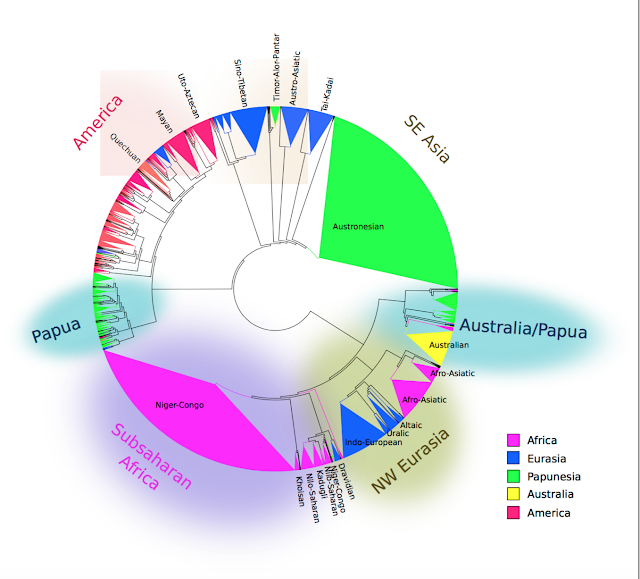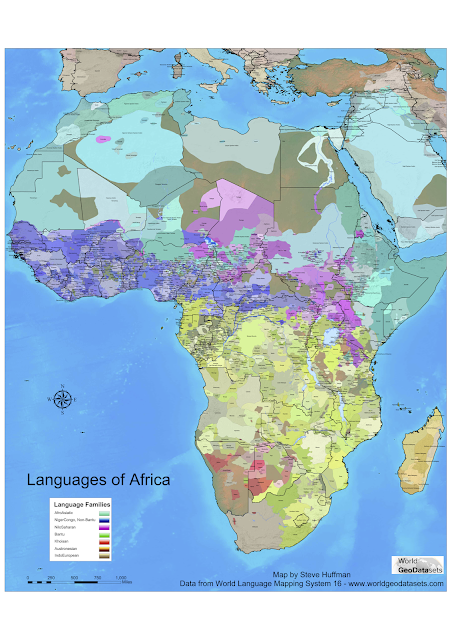The importance of studying diversity in the field of linguistics
Here's another one of those recommendations to go read something that is interesting, important, freely available online and quite accessible to non-scholars. Now, that we need to study diversity might be a rather trivial observation to many readers of this blog which is a lot about linguistic diversity, but it apparently still needs to be said and elaborated upon.
This time it's Greville Corbett who has kindly uploaded his paper "Why Linguists Need Languages" to the social sharing platform for academics: academia. This is sometimes known as blue open access, social sharing platform open access.
Free online PDF here
Full reference: Corbett, Greville G. (2001) Why Linguists Needs Languages. In Maffi, Luisa (Ed) On Biocultural Diversity. Linking Language, Knowledge and the Environment. Washington & London: Smithsonian Institution Press, 517-530.
Quote from the paper:
To an outsider, it must seem self-evident that linguists would have a key role in any investigation of the interdependence of linguistic, cultural, and biological diversity. And yet there are many professional linguists who are not concerned about diversity and its imminent reduction. This is surprising, given the situation evoked by this chilling quote:
Obviously we must do some serious rethinking of our priorities, lest linguists go down in history as the only science that presided obliviously over the disappearance of 90% of the very field to which it is dedicated. (Krauss 1992a:10)
This chapter makes the basic but essential point that linguistic diversity is central for linguistics.
(…)
In order to do linguistics properly, we need every lat language that there is. And this is message for linguists as much as for others. While linguists have a strong professional interest in the issue, this is a much wider concern at stake.
If we want to understand ourselves, languages gives away a good deal: In the study of language, we embrace the very definition of what it means to be humans and to be a developing member of the species. (John L. Locke 1993:4)
Abstract (from when he presented it a paper with the same title at a conference)
Linguists are making increasingly detailed and sophisticated claims about the interrelations of linguistic constructions and of linguistic categories. Research of this type raises the question of the range of data required. Although at first sight the availability (in principle) of 6000 languages might appear wholly adequate, this is not straightforwardly the case. On the one hand, the same features may appear in different languages because they are genetically related; in fact, many languages form large families (Niger-Kordofanian has over 1000 members and Austronesian over 900), which drastically reduces the number of sources of data which are undeniably different. On the other hand, the areal spread of features means that even genetically unrelated languages may share features from a single source. These problems, made more acute by the rapid loss of languages (in Europe as in the other continents), are only just beginning to be appreciated by those who should be most aware of them, for quite selfish reasons, namely linguists. Examples will be given of particularly interesting features which have been found in languages that happen to be endangered, to give some idea of the seriousness of their loss for linguists.
_______
You might also want to read this widely cited article below which among other things explains to non-linguists interested in language (aka psychologists) that
a) far from all linguists are in agreement over certain universals and theoretical models that are sometimes widely used as representation of language in the mind
b) there's lots and lots of diversity.
Evans, N., & Levinson, S. C. (2009). The myth of language universals: Language diversity and its importance for cognitive science. Behavioral and Brain Sciences, 32(5), 429-492. doi:10.1017/S0140525X0999094X (free PDF available online)
This time it's Greville Corbett who has kindly uploaded his paper "Why Linguists Need Languages" to the social sharing platform for academics: academia. This is sometimes known as blue open access, social sharing platform open access.
Free online PDF here
Full reference: Corbett, Greville G. (2001) Why Linguists Needs Languages. In Maffi, Luisa (Ed) On Biocultural Diversity. Linking Language, Knowledge and the Environment. Washington & London: Smithsonian Institution Press, 517-530.
To an outsider, it must seem self-evident that linguists would have a key role in any investigation of the interdependence of linguistic, cultural, and biological diversity. And yet there are many professional linguists who are not concerned about diversity and its imminent reduction. This is surprising, given the situation evoked by this chilling quote:
Obviously we must do some serious rethinking of our priorities, lest linguists go down in history as the only science that presided obliviously over the disappearance of 90% of the very field to which it is dedicated. (Krauss 1992a:10)
This chapter makes the basic but essential point that linguistic diversity is central for linguistics.
(…)
In order to do linguistics properly, we need every lat language that there is. And this is message for linguists as much as for others. While linguists have a strong professional interest in the issue, this is a much wider concern at stake.
If we want to understand ourselves, languages gives away a good deal: In the study of language, we embrace the very definition of what it means to be humans and to be a developing member of the species. (John L. Locke 1993:4)
Abstract (from when he presented it a paper with the same title at a conference)
Linguists are making increasingly detailed and sophisticated claims about the interrelations of linguistic constructions and of linguistic categories. Research of this type raises the question of the range of data required. Although at first sight the availability (in principle) of 6000 languages might appear wholly adequate, this is not straightforwardly the case. On the one hand, the same features may appear in different languages because they are genetically related; in fact, many languages form large families (Niger-Kordofanian has over 1000 members and Austronesian over 900), which drastically reduces the number of sources of data which are undeniably different. On the other hand, the areal spread of features means that even genetically unrelated languages may share features from a single source. These problems, made more acute by the rapid loss of languages (in Europe as in the other continents), are only just beginning to be appreciated by those who should be most aware of them, for quite selfish reasons, namely linguists. Examples will be given of particularly interesting features which have been found in languages that happen to be endangered, to give some idea of the seriousness of their loss for linguists.
_______
You might also want to read this widely cited article below which among other things explains to non-linguists interested in language (aka psychologists) that
a) far from all linguists are in agreement over certain universals and theoretical models that are sometimes widely used as representation of language in the mind
b) there's lots and lots of diversity.
Evans, N., & Levinson, S. C. (2009). The myth of language universals: Language diversity and its importance for cognitive science. Behavioral and Brain Sciences, 32(5), 429-492. doi:10.1017/S0140525X0999094X (free PDF available online)



Comments
Post a Comment